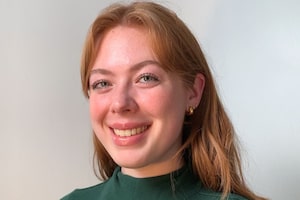Jordee Reid at Thetis Lake in Victoria, B.C., on April 25. Reid started learning Denesuline after giving birth to twin boys in 2018.CHAD HIPOLITO/The Globe and Mail
Jordee Reid, a Dene living in Victoria, said her grandmother thought raising her children in English would give them the best life. After surviving the residential school system, her grandmother was left with a broken link to her civilization and was the last Denesuline speaker in their family, Ms. Reid said.
Residential schools contributed to generation gaps of Indigenous children who grew up disconnected from their communities, or who were too traumatized to share their knowledge.
A large part of Indigenous history and storytelling is oral. Living knowledge keepers and mother-tongue speakers are getting older. There is a race against time for the younger generations to learn their stories and languages before they are lost.
“It’s really a tragedy that for so many years, thanks to government policy, those stories containing law and traditions, the highlights of who that nation was, haven’t been passed on,” said Ian Martin, professor at York University and an expert in Indigenous language policy.
He has been working with Indigenous peoples to recover their languages since the 1970s. Some of them are now starting to pick up the pieces. Five thousand subscribers – and counting – share their stories and help one another learn the Dene language through a Facebook group called Everything Denesuline.
Ms. Reid joined the group in 2021, but her language journey started earlier. When her grandmother passed away, she felt like a part of her identity vanished, but it wasn’t until she gave birth to twin boys in 2018 that she developed a strong desire to learn Denesuline.
“I always had a love for my language, but not necessarily a want to learn it. Once I had my kids, it became all I wanted to do,” she said. “Sometimes I felt like I didn’t even really want to speak English to them.”
Jordee Reid is part of a program where she works with a mentor who teaches her Denesuline.CHAD HIPOLITO/The Globe and Mail
She joined the Northwest Territories Mentor-Apprenticeship Program, aimed at teaching participants their own traditional languages. Funded by the NWT and Indigenous governments, the program helps participants explore their identities. Similar programs are also available in British Columbia and Saskatchewan.
Indigenous peoples apply in pairs, one as a mentor and one as an apprentice, and if accepted, both get paid. Ms. Reid chose her mentor specifically because she is fluent in a dialect of Denesuline spoken in Rocher River, where her grandmother was from in the NWT – a community that no longer exists. “It meant a lot for me to find someone that could teach me my grandmother’s dialect,” she said. Her mentor has also been able to share stories about Rocher River.
Learning Denesuline overwhelmed Ms. Reid with feelings of sadness. She mourned the knowledge she could have had from her grandmother if circumstances had been different.
Above all, Ms. Reid was angry. She started avoiding sessions with her mentor. “There was a lot of processing of these big feelings that had to happen,” she said. “It’s a huge emotional toll to learn your language.”
Another member of the Facebook group, Alyssa Francois, acts as a translator between elders and youth in Buffalo River Dene First Nation, where she lives in Saskatchewan. Denesuline is the 25-year-old’s first language. Many elders in Buffalo River don’t speak English. Many youths don’t speak Denesuline.
Her position isn’t easy, Ms. Francois said. There is a gap in generational beliefs between the elders and the youths. Sometimes she doesn’t agree with critiques the elders share. While she’s grateful that she knows her language, she feels the burden of deciding when to translate and when to educate. “I hate understanding people sometimes,” she said.
Thomas Piche is a residential school survivor and has been in education for 50 years. He teaches music in Denesuline to children from kindergarten to Grade 8 at the reserve school in Cold Lake First Nations in Alberta. He also instructs an Indigenous studies class and one on local government, both taught in a mix of English and Denesuline. He incorporates elements of Dene culture into other areas of schooling he’s involved with.
Instead of a student council, for instance, the pupils elect counsellors and a chief in each class. Through this process, Mr. Piche teaches them about negotiations and treaty signing. Students bargain for pizza parties and longer recesses, ending the year with a treaty-signing ceremony involving community leaders from outside the school.
“We want to retain our languages because our songs and stories and everything are safeguarded in language,” Mr. Piche said. “Once it’s lost, so are all the stories, and the culture along with it is watered down.”
Like most members of the Facebook group, Ms. Reid is nowhere close to being fluent in Denesuline. But she’s incorporated many words and phrases into her life to bring the language into her family.
Instead of saying “I love you,” to her children, Ms. Reid says, “Neghanta dúe,” which means “I love you a lot,” or, “I love you very,” in her dialect. While her five-year-old sons can’t pronounce the full phrase yet, they babble back, “dúe, dúe, dúe,” meaning “a lot, a lot, a lot.”
“I think learning Denesuline changed my life,” she said.
 Catriona Koenig
Catriona Koenig